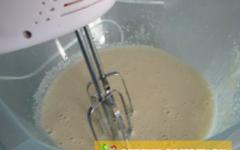We continue the series of articles devoted to dialogues in English. Today we will give examples of dialogues in a restaurant or cafe with translation into Russian, and also talk about how to write a dialogue “IN THE RESTAURANT” (dialogue at the restaurant). Useful phrases given in the article will help you cope with this task.
How to write the dialogue “In a restaurant”, “In a cafe”?
Do you know what phrases to use in a restaurant? What phrases do waiters use? If not, study these phrases before writing dialogue.
Waiter phrases ( Waiter / Waitress):
|
Taking notes about the order: · Would you like to order? · Can I help you? Are you ready to order? · Are you going to try any of our...? |
Order Notes: Do you want to place an order? I can help you? Are you ready to order? Are you going to try any of our...? |
|
Offering Food · Would you like a / an / some…? · What about a / an / some…? · Can I get you a / an / some...? · Won’t you go for a / an / some...? |
Offering dishes Do you want...? And how about...? Should I bring you...? Would you like...? |
|
Asking about preferences: · Do you prefer…? · How would you like it? |
Asks about your preferences: You prefer...? Perhaps you will like...? |
|
Asking about drinks: · What would you like to drink? · Anything to drink? |
Offers drinks: What would you like to drink? Anything to drink? How about something to drink? |
Client phrases ( Customer)
|
Ordering a meal: · Excuse me, waiter, we’d like to order. · We are ready to order now. · I’d like a / an / some…and… · I want a / an / some…and… · I’ll go for a / an / some… · Please bring me a / an / some… |
Order food: Excuse me waiter, we'd like to order. We are ready to order now. I would like...and... I want...and... I would take... Please bring me... |
|
To accept / refuse the offer: · No, thanks. I’d like/prefer a/an/some… |
Agree/refuse the offer: · Yes please. · No thanks. I would like/prefer... |
|
Deciding about drinks: · I'd like... · Could you bring me..., please? |
When deciding on drinks: · I would like to... · Could you bring me... please? |
|
Asking about the bill: · Could I have the bill, please? · Could you bring me the bill, please? |
Request an invoice: Can I have the bill please? Could you bring me the bill please? |
I hope these phrases will help you create your own “At the restaurant” dialogue.
Dialogue “Ordering meals at a restaurant” for 3 characters.
Waiter: Good afternoon, sir.
Tim: I would like a table for two.
Waiter: All right. Follow me, please.
Tim: Can we have the menu, please?
Waiter: Here you are, sir.
Tim: What would you like to eat, Katya?
Katya: I would like a vegetable soup and some grilled fish.
Waiter: Are you ready to order?
Tim: Yes, two vegetable soups and one grilled fish with salad and one roast beef. And two strawberry ice creams for desert.
Waiter: Would you like some bread?
Tim: Yes, please.
TRANSLATION OF THE DIALOGUE “ORDERING FOOD IN A RESTAURANT”
Waiter: Good afternoon sir.
Tim: I'd like a table for two.
Waiter: Fine. Follow me please.
Tim: Can I have a menu please?
Waiter: Please sir.
Tim: What would you like, Katya?
Kate: Vegetable soup and grilled fish.
Waiter: Are you ready to order?
Tim: Yes, two vegetable soups, one grilled fish with salad and one roast beef. And two strawberry ice creams for dessert.
Waiter: Bread?
Tim: Yes please.
Dialogue #2. Ordering dinner.

— May I take your order?
- Yes, please. For the appetizer, I"d like the shrimp cocktail.
— And what kind of salad would you like?
— I"ll have the spinach salad.
— And for the main course?
— I"d like the baked chicken please.
— What side dish would you like with that?
- Hmm. I think I"ll have rice.
— Would you care for some dessert?
- Yes. I"ll have some apple pie.
TRANSLATION OF THE DIALOGUE ORDERING LUNCH AT A RESTAURANT
— Can I accept your order?
- Yes please. For an appetizer, I want shrimp cocktail.
— What salad will you take?
— I'll have spinach salad.
- Main course?
— Baked chicken, please.
— What side dish do you prefer?
- Hm. I think let's have rice.
- Would you like dessert?
- Yes. I'll have apple pie.
Dialogue “At the restaurant”.
A – Andrew, W – Waiter.
A: Waiter! I’d like the menu, please.
W: Here you are, sir.
W: Are you ready to order?
A: Yes, I am. Can I start with tomato soup? Then the salmon and steak, please.
W: What steak would you like: rare, medium or well - done?
A: Medium, please.
W: And would you like vegetables or salad?
A: Vegetables, please.
W: Would you like any wine?
A: Yes, white, please.
A: Waiter! Can I have the bill, please?
W: Here you are.
A: Is service included?
W: Yes, it is.
A: Can I pay by credit card?
W: Yes, of course.
TRANSLATION OF DIALOGUE IN A RESTAURANT.
A - Andrey,O – Waiter.
A: Waiter! I'd like a menu, please.
O: Please, sir.
O: Are you ready to order?
A: Yes. I'd like tomato soup, then salmon and steak, please.
O: What kind of roast do you prefer: rare, medium or full?
A: Medium, please.
O: Would you like vegetables or salad?
A: Vegetables, please.
O: Perhaps wine?
A: Yes, white wine please.
A: Can I have the bill, please?
O: Please.
A: Is service included in the bill?
A: Can I pay by credit card?
O: Yes, of course.
I hope you found these conversations helpful.
Or a pub - the task, at first glance, is completely simple. Despite its apparent simplicity, many Russian tourists make mistakes or are simply lost when trying to find the right phrase. As a result, the majority simply translates what they want to say verbatim from Russian. This is called “tracing” and in most cases puts waiters, bartenders, cashiers and other service personnel into a cultural stupor.
The first thing a Russian tourist in an English-speaking country should learn is that literal translation is his worst enemy. In addition, even if a tourist had straight A’s in English at school, he will hardly be able to freely explain what exactly he needs without learning a number of useful phrases, which will be given later in this article.
How to call a waiter?
Let's say a tourist has received his order, emptied his plate, and is now about to ask for the bill. Before you rack your brains over the phrase “Can I have the bill?” in English, in a restaurant you need to attract the attention of the wait staff. The tourist recalls how he would do this in an ordinary Russian cafe:
- Young woman! Can I see you?
Then, if the tourist did not look into the phrase book and did not learn the corresponding phrases, he will certainly translate his version, familiar to Russian cafes, literally:
- Girl! Can I have you?
After which he will be puzzled for a long time and with concentration why the waitress was offended/angry/crying/slapped him in the face, and he was rudely thrown out of a decent establishment.
The fact is that the above phrase is in no way suitable for communicating with service personnel in a restaurant or cafe. Moreover, the only group of people for whom rough treatment of a girl is applicable are women of easy virtue. This is why tracing is the worst enemy of the tourist.
You should contact waiters or waitresses using one of the following options, depending on the situation:
- Miss.
- Madam (M"am).
- Mister.
To attract the attention of the service personnel, you do not need to contact them at all - you can simply raise your hand.
Let's assume that the tourist managed to attract the attention of the waiter and did not find himself thrown out of the establishment with a demand not to return to it again. To ask for a bill in a restaurant in English, he can use one of several phrases of varying degrees of politeness.

If a traveler has not sat down with an English textbook for many years, an easy-to-remember remark will help him:
- Bill, please.
If he really had an A in this subject, and some knowledge from school was retained, he may well show politeness and good manners and ask for a bill at a restaurant in English, using a more complex, but more cultural phrase:
- Can I have the bill, please?
- Can I please have the bill?
If a tourist for some reason does not use these phrases, for example, he forgot what the English translation of the word “bill” in a restaurant is, he may well use another phrase that does not contain a direct request:
- I would like to pay now, please (I would like to pay/pay now).
In addition, he will certainly receive a bill if he asks how much his order costs.
- How much does it cost?
To ask for a bill in English in a restaurant or cafe, the following option is a little more familiar:
- How much is the total (How much does it all cost)?
In addition, the tourist may ask how much he owes. In English there is a phrase for this, almost similar to Russian:
- How much do I owe you?
From these phrases, it is quite possible to choose only the ones you like, but it will be much more effective to learn them all. Just in case.
Having received the invoice, the tourist will certainly study it carefully. And it is possible that he will find an error or inaccuracy in it, which he will definitely want to report.

Of course, in English.
- I think/guess/believe the bill is added up wrong (I think/it seems to me that there is a mistake in the bill).
This expression is appropriate if the traveler had an A not only in English, but also in mathematics, and he is absolutely sure that there is something wrong with the score. If he is not sure, and there is no calculator at hand, you can formulate your claim more politely - in the form of a question:
- Is it just me, or the bill is added up wrong?
Or even more politely:
- Are you sure the bill is added up right?
Such a claim is not considered offensive or rude in cultural institutions. This only means that the tourist wants to check everything again, so any waiter will readily explain what the tourist is going to pay for.
How to pay in a company
A traveler may well dine not alone, but with friends.

If these are not very close friends of different social status, and on the common table expensive lobsters are side by side with cheap vegetable salad, the following phrase will come in handy:
- We are paying separately.
Each person present will receive a separate bill, and guests will not have to pay for someone else's lobster.
If the company is friendly and everyone eats about the same thing, the bill can be divided:
- Let's split the bill (Let's pay equally).
If one person has more green bills in his wallet than his companions, he may well show a gesture of goodwill and pay for everyone:
- I "m paying for everything (I pay for everything / I pay for everyone)!
If you do not want to remain in debt to anyone, offer to pay for yourself:
- Let me pay my share (Let me pay my share).
By the way, when trying to impress your companions (or companion), you can use the following phrase:
- Put it on my bill, please.
How to ask for a check
To receive a check, you can use a phrase very similar to the one used to ask for an invoice.
- Check, please (Check, please).

The more polite option is slightly different:
- Can I get the check, please?
In general, asking for a check or bill at a restaurant does not require any particularly complex phrases.
Summing up
Asking for a bill in English in a cafe or restaurant is not difficult. If you learn the appropriate phrases, practice at home in front of a mirror and try not to worry, you can make a good impression on others, not lose face and enjoy visiting a cafe or restaurant. It is important to remember that you should not copy phrases from Russian and do not hesitate to ask for help if necessary.
There is hardly a person in the modern world who does not like to go to cafes or restaurants. Going to a restaurant, especially in a foreign country, is not just an opportunity to satisfy your hunger, but also to spend time with friends, have a great rest, gain new impressions, and taste unfamiliar dishes, right? In addition, there is no need to clear the table and wash the dishes after dinner. In European countries, dining out is the norm. And if you are visiting one of the English-speaking countries, be prepared for the fact that you will have to visit a restaurant every day. In order to avoid getting into trouble when ordering foreign dishes, you will need knowledge of English restaurant vocabulary. How to book a table in a restaurant, how to place an order to the waiter, how not to get confused about the names of dishes? Before going to an English restaurant, it is better to be well prepared. We have collected for you the basic phrases that you will need when going to an English restaurant.
If you go to a restaurant in the evening, it is better to book a table in advance at the restaurant where you want to go. This can be done by phone or by visiting the desired restaurant the day before.
We would like to make a reservation. — We would like to reserve a table.
You can say it a little differently:
I'dlikeatablefor 7p.m.please.– I would like to reserve a table for 7 pm.
Be prepared for the waiter to ask you how many people the table is for, in a smoking or non-smoking room, in whose name to reserve a table, etc.
You came to the restaurant and sat down at a table. The waiter will bring the menu and ask:
Would you like a drink?
Would you like something for aperitif?
Don't be alarmed. It simply invites you to order drinks before the main course, which is an aperitif.
After the waiter brings you drinks, he will ask if you are ready to choose something and if you are ready to place an order:
Can I take your order? — Can I take your order?
Areyoureadytoorder? — Are you ready to order?
If you're not ready yet, don't worry. You can ask the waiter to wait a few minutes – can we take a few more minutes? or we need a few more minutes.
You can also ask the waiter for advice, especially if you are not entirely sure about the correct understanding of the names of the dishes.
Whatdoyourecommend?– What do you advise us?
Whatareyourspecialties?– What are the most popular dishes in your restaurant (or the most delicious)?
If you don't find what you would like on the menu, ask the waiter: « Doyouhave...?"- you have…?
To order your chosen dish, just say Iwouldlike(I would like) and the name of the dish. It would also be correct to say - Couldyoubring…?(could you bring...?). Not sure if you'll pronounce it correctly? Just point to the desired line in the menu.
If you don't hear what the waiter says, don't hesitate to ask again. It's better to ask again than to receive the wrong dishes.
Couldyourepeat,please?– could you repeat?
or simply
Excuseme?
If, nevertheless, they brought you something that was not at all what you wanted, say:
ThisisnotwhatIordered;Iordered…- this is not at all what I ordered, I ordered... and name the dish you wanted.
The order is placed, you enjoy delicious food and drinks, a pleasant atmosphere and conversation with friends. And now the dinner is coming to an end, it’s time to ask for the bill.
The easiest way to do this is to tell the waiter - Check, please! Which translated into Russian means – Invoice, please.
When dining in some prim English restaurant, it is better to say “ May we have the bill?" It will sound more "English".
And the last thing you need to know is service charge or tip, in other words, a tip, which usually amounts to 10 or 15% of the total order amount. Often in restaurants, service charges are already included in the bill.
Knowing all these phrases, you will probably not experience any problems when going to a restaurant in England. Bon appetit in an English restaurant!
Hello, potential visitor to our English course for waiters!
It is impossible to imagine even a small town without restaurants or cafes. And in such an establishment we always meet friendly, or, on the contrary, sullen staff. The waiter/waitress is the face of the restaurant. Depending on how he greets guests, serves them and communicates with them, we can find out whether they will want to visit this place again. Today we will talk about English for waiters and business English, we will tell you a few useful phrases in order to serve the client correctly. After all, in order to build this business correctly, waiter-client communication is needed. Native Eng lish School offers you and
This profession is suitable for people who are neat, energetic, punctual, friendly and stress-resistant. Since restaurant guests can be quite colorful personalities and provoke a conflict situation out of the blue, the waiter must be able to cope with it and smooth out rough edges. Although this work is demanding and does not always have a convenient schedule (most often, waiters work in shifts - 12 hours a day), it is considered well paid. Of course, this depends on the level of the establishment. The higher the class of the restaurant, the more tips the employee receives. It is generally accepted that you need to leave the waiter a tip of 10% of the order amount if the tip is not included in the bill. The rate may be minimal or non-existent.
DO YOU WANT TO LEARN ENGLISH IN 6 MONTHS?
 The income of a waiter in the USA or England significantly exceeds the salary of an employee located in Russian-speaking countries. Therefore, many young people are in a hurry to go abroad to earn extra money, and if they do not stay in another country for permanent residence, then return to their home country in order to open their own business. You need to understand that without knowing English and meeting the company’s requirements, no one will hire you. Our team invites you to familiarize yourself with useful phrases that you can use when serving guests.
The income of a waiter in the USA or England significantly exceeds the salary of an employee located in Russian-speaking countries. Therefore, many young people are in a hurry to go abroad to earn extra money, and if they do not stay in another country for permanent residence, then return to their home country in order to open their own business. You need to understand that without knowing English and meeting the company’s requirements, no one will hire you. Our team invites you to familiarize yourself with useful phrases that you can use when serving guests.
At Native English School, we devote maximum time to things that are important and useful to you, adjusting the course to the needs and desires of each of our students in order to make the learning as useful as possible.
When meeting guests, the first thing you need to do is greet them.
- Good evening, ladies.- Good evening, ladies.
- Good evening, gentlemen.- Good evening, gentlemen.
- Do you have a reservation? – Have you reserved a table?
After you have escorted your guests to their table, you need to serve the menu.
- Here are your menus. I will be back to take your order in a minute.- Here are your menus. I'll be back in a minute to take your order.
- May I take your order? Are you ready to order?– Can I take your order? Are you ready to order?
- What would you like to drink?-What would you like to drink?
- Would you like to start off with appetizers or with entrees?– What do you want to start with - appetizers or main course?
 If a certain dish is not available today, but the guest ordered it, you need to offer him a similar option so as not to upset him. Or interest him with a more interesting and sophisticated choice.
If a certain dish is not available today, but the guest ordered it, you need to offer him a similar option so as not to upset him. Or interest him with a more interesting and sophisticated choice.
- I am sorry but this dish is not available tonight may I offer you ___ - I'm sorry, but this dish is not available today, may I offer you ___?
- Would you like something else ? – Do you wish for anything else?
The work of a waiter requires maximum attention to his guests. It must be remembered that during their stay in the restaurant, the guest can make additional orders, and the service staff must also monitor the filling of glasses. 
- More wine, sir? -More wine, sir?
- Would you like soup or salad? – Would you like soup or salad?
- I would like to let you know about the specials we have tonight – I would like to notify you about today's special offers.
- Here you are, enjoy your meal. – Your dishes, bon appetit.
It's definitely worth learning how to submit an invoice. Often guests want to pay each for their order. To avoid any confusion, it is worth clarifying this in time.
- Do you want to pay separately? – Do you want to pay separately?
- Here is the bill. - Your account.
When traveling, you want to visit all the sights and interesting places. At the same time, it is no less interesting to taste exotic dishes in the best cafes and restaurants around the world. Probably every traveler has encountered the problem of ordering something delicious in another country when the language level is not very high. This article will help you learn how to book a table, check with the waiter for information, or, sometimes this is also very necessary, complain to the administrator in English.
Book a table
If you are planning to visit any fancy restaurant, it is better to reserve a table (to book a table) in advance, especially if you plan to visit on a Friday or Saturday evening.
- I would like to book a table, please.- I would like to reserve a table, please.
- I would like a table for two.- I would like a table for two.
- When for?- for when?
- For what time?- for how long?
- Smoking or non-smoking?- (The hall) for smokers or non-smokers?
- Can I get your name?- May I know your name?
Dialogue
Customer: Good evening. I"d like to book a table in your restaurant, please.
Receptionist: I will be happy to help you. When would you like a table for?
Customer: For Wednesday evening, at 6 p.m. m.
Receptionist: Wednesday evening, October 13. For how many people?
Customer: For five people.
Receptionist: Sure. Can I get your name please?
Customer: Smith.
Receptionist: Could you give me your contact number?
Customer: Sure, it's 7589634129.
Receptionist: So, that"s a table for 5 people for Wednesday evening, October 13. Thank you, Mr. Smit. We are waiting for you.
Customer: Thank you. Goodbye!
Dialogue
Client: Good afternoon, I would like to reserve a table in your restaurant please.
Administrator: I will be glad to help you. When would you like to book a table?
Client: For Wednesday evening, at 6 o'clock.
Administrator: Wednesday evening, October 13. How many people?
Client: For five.
Administrator: Of course. May I know your name?
Client: Smith.
Administrator: Could you give me your contact telephone number?
Client: Of course. 7589634129.
Administrator: So, a table for five for the evening of Wednesday, October 13th. Thank you Mr Smith. We are waiting for you.
Client: Thank you. Goodbye!
Order food
Arriving at a cafe, you will need to order delicious dishes, the list of phrases below will help you do this quickly and easily. But, do not forget to mention if you are allergic to foods, use the phrase I'm allergic to...(I'm allergic to...) or just tell me I don't eat...(I do not eat...)
- Could you bring the menu, please?- Could you bring me the menu, please?
- Could I see the wine list, please?- can I see the wine list, please?
- Are you ready to order?- Are you ready to order?
- I am not ready yet.- I'm not ready yet.
- What do you recommend?- What do you recommend?
- I would like the set lunch.- I would like a set lunch.
- I will take this.- I will take it.
- Does it contain...?- Does this dish contain...?
- What specials do you have?- What special dishes do you have?
- For here or to go?- Here or with you?
- - Would you like anything else?
- Nothing else, thank you- Nothing more, thank you
- How long will it take?- How long will it take?
- Would you like any coffee or dessert?- Do you want coffee or dessert?
- Could you bring us some more bread/ milk/ water?- Could you please bring us some more bread/milk/water?
Dialogue
Waiter: Welcome to our restaurant. Here are your menus. I’ll be back to take your order in a few minutes.
Waiter (in a few minutes): Are you ready to order?
Customer: I’ll have the fried potato.
Waiter: Would you like anything to drink?
Customer: I'll have tea.
Waiter: Would you like anything else?
Customer: Yes, please. I would like some boiled vegetables.
Waiter: Would you like any dessert?
Customer: No, thank you. How long will it take?
Waiter: It will take about 15 minutes.
Dialogue
Waiter: Welcome to our restaurant. Here are your menus. I'll be back in a few minutes to take your order.
Waiter (after a couple of minutes): Are you ready to order?
Visitor: I'll have fried potatoes.
Waiter: Would you like something to drink?
Visitor: I'll have tea.
Waiter: Anything else?
Visitor: Yes, please. I would like some boiled vegetables.
Waiter: Would you like dessert?
Visitor: No, thank you. How long will it take?
Waiter: It will take about 15 minutes.

Complain
Unfortunately, situations arise when breakfast, lunch or dinner are not as rosy as expected. The waiter may be rude, the dish may be too salty, bitter or cold. It is better to resolve such issues immediately so that in the future you can only use high-quality service.
- This food is cold.- The food is cold.
- This dish is too salty.- This dish is too salty.
- We've been waiting a long time.- We've been waiting for a long time.
- Can I see the manager, please?- Can I see the administrator?
- This meat is underdone/over roasted.- This meat is undercooked/overcooked.
- This dish is not cooked enough- This dish is undercooked.
- On the house.- At the expense of the establishment.
Dialogue
Customer: Excuse me! My meal is too salty. Could you take care of it, please?
Waiter: Excuse me. I'll change it right now.
*2 hours later*
Customer: Thank you. Now it's ok.
Dialogue
Visitor: Sorry! My dish is too salty. Could you take care of this please?
Waiter: Sorry. I'll replace it right now.
*2 hours later*
Visitor: Thank you. It's fine now.
Bill payment
To leave in English means to leave a place without saying goodbye. Of course, this English tradition is quite interesting, and nevertheless, while in a restaurant or cafe, you will still have to talk to the waiter again before leaving to ask for the bill (bill, check). By the way, both words are used to mean the word bill, only the word bill is used in Britain, and check in the USA.
- The check, please.- The check, please.
- Could we have the bill, please?- Can we have the bill, please?
You can clarify questions about payment using these phrases:
- Can I pay by card?- Can I pay by card?
- Do you take credit cards?- Do you accept credit cards?
- Is service included in bill?- Is the service charge included in the bill?
- Can we pay separately?- Can we pay separately?
- Keep the change. - Keep the change for yourself.
Dialogue
Waiter: May I take away the dishes?
Customer: Yes, please. And could you bring us the bill?
Waiter: Yes, of course. How would you like to pay: in cash or by credit card?
Customer: By credit card. Here you go.
Waiter: Ok. Here is your bill.
Customer: Thank you. Is the service included?
Waiter: Yes, it is. Have a good day!
Dialogue
Waiter: Can I clear the dishes?
Visitor: Yes, please. And could you bring me check?
Waiter: Yes, of course. How would you like to pay: cash or card?
Visitor: Credit card. Here she is.
Waiter: Okay. Here is your bill.
Visitor: Thank you. Is maintenance included?
Waiter: Yes. Have a good day.

Idioms about food
Apple polisher- this is not the profession of an apple polisher, as one might think. This is how you can call a person a sucker or a sycophant.
To compare apples to oranges- you don't have to literally compare apples and oranges, this phrase should be used when you are comparing something that is undersupplied.
To go bananas- use this phrase when someone is going crazy with joy or anger.
As easy as pie- if the business you are doing is very easy, then use this phrase - as easy as shelling pears.
Cool as a cucumber- this is how you can call a person who remains calm in any situation and remains absolutely cold-blooded.
It’s always a pleasure to sit in a cozy atmosphere with friends, have a nice conversation and eat delicious dishes, and especially if you can order food in English without any problems. You can also gain additional experience thanks to this video.
We hope this article will help you feel more confident in any restaurant.
Big and friendly EnglishDom family









